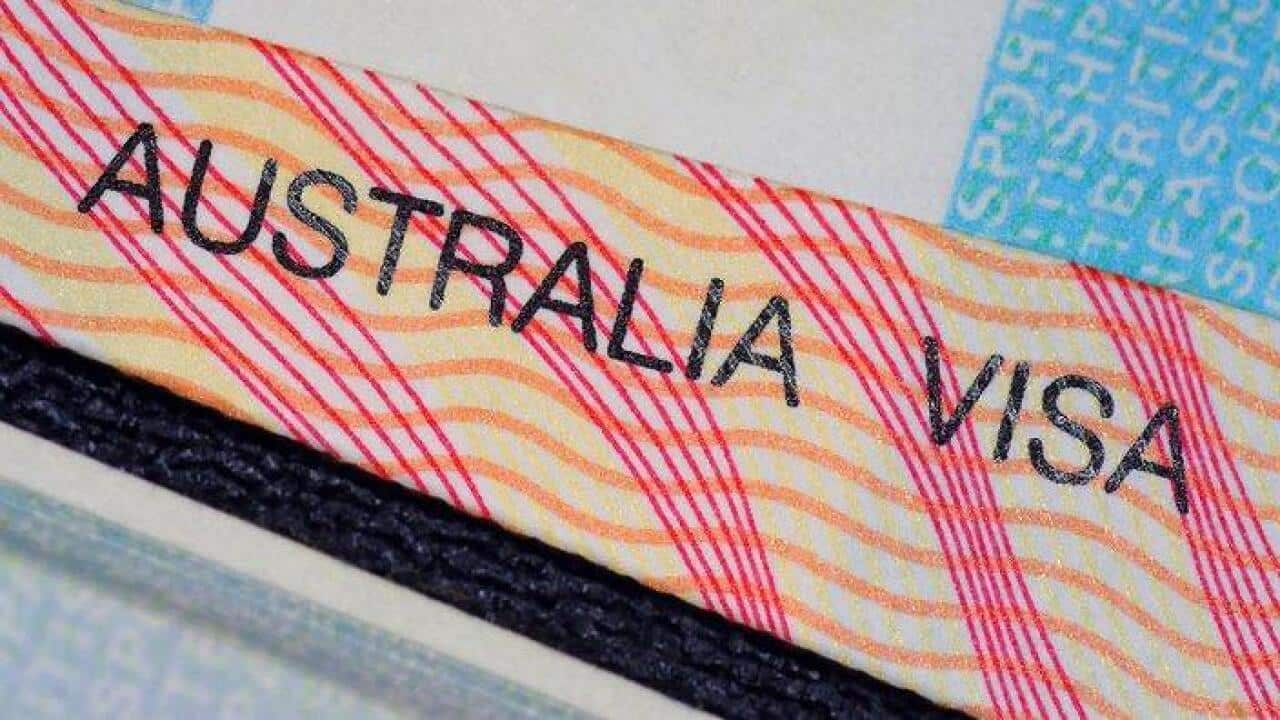Highlights
- Experts say the special family violence provisions in the migration law do not go far enough to assist all temporary visa holders who suffer family violence
- They rue a lack of protections for victims of family violence on temporary visas other than partner visas
- Advocates have been calling for a new temporary visa for family violence victims so that they can seek help without fear of losing their visa
Francesca*, an Italian national, was on a student visa when she started dating an Australian man.
He came across as a loving and caring man. However, things changed after they started living together.
"He almost strangled me on a few separate occasions. Once I thought 'I'm going to die'. I could not breathe," she says.
The violence got worse over time.
"Once he punched me in the face so badly that I was covered in bruises."
But Francesca never reported any of these events to the police, fearing she could lose her visa as a result.
"In my mind, I was trapped. I was terrified of having to move back to Italy, where I had also been a victim of domestic violence, and I would have done anything to stay in Australia."
She says her boyfriend had promised he would apply for a partner visa for her, which made her stay in the relationship even though it was turning increasingly violent.
"He always made me feel like I was the problem, that it was my fault that he was hitting me. He would say 'I can't live without you, but you are crazy'...He was trying to blame me for his behaviour.
"It was the typical domestic violence cycle," she adds.
She had never told anyone about her situation until, one day after being assaulted again, she discussed it with a colleague at work. He helped Francesca collect her belongings from the house, and she ended the relationship.
'I am scared my husband would take me off his 457 visa'
Like Francesca, Claudia* also feels trapped in a violent relationship. She came to Australia from Italy as a family member on her husband's 457 visa with their children.
She fears she will lose the right to stay in Australia if she ends the relationship with her husband.
"The whole family came to Australia on my husband's 457 visa, so we all depend on his visa. But if he takes me off his visa I would have to go back to Italy and leave my children here with him — and I would never do that," she says.
She thinks her only option is to put up with the abuse until she gets permanent residency in Australia.
'The problem is the migration system.'
Experts say these cases underscore the need to reform Australia's migration system.
According to Marie Segrave, an associate professor of criminology at Monash University, situations like these highlight the need to reform the migration system.
"The migration system says nothing about how they will support women experiencing family violence unless they hold a partner visa," she says.  "So, the system is really set up to say, 'hang on until you have permanent residency otherwise nothing will happen,' which is a terrible way to have a system because it means that if people are in a position [like the ones described by Francesca and Claudia] until they've had a permanent residency, they have no guarantee of any right to remain in Australia," Professor Segrave told SBS Italian.
"So, the system is really set up to say, 'hang on until you have permanent residency otherwise nothing will happen,' which is a terrible way to have a system because it means that if people are in a position [like the ones described by Francesca and Claudia] until they've had a permanent residency, they have no guarantee of any right to remain in Australia," Professor Segrave told SBS Italian.

Associate Professor Marie Segrave, deputy director of Monash's Migration and Inclusion Centre and researcher at the Monash Gender and Family Violence Prevention Centre. Source: Monash University (supplied)
Family violence provisions
The Department of Home Affairs says it has invested $1 billion since 2013 to address domestic and family violence, including to support the COVID-19 response. Special family violence provisions in the Migration Act enable victims of family violence who have applied for the partner visa to access permanent residency.
"There are family violence provisions in the Migration Regulations which allow temporary Partner Visa holders in Australia to be granted permanent residence if their relationship has broken down and they have suffered domestic or family violence perpetrated by the sponsor," a spokesman for the Department said.
In the past five years, we've granted permanent visas to 2450 victims of domestic violence under these provisions.
But advocates have been warning the Government that these provisions are only available to partner visa holders and applicants, leaving victims on other temporary visas without a clear migration pathway, which often deters them from leaving a violent relationship.
'No pathway' to permanent residency for many victims
The Department of Home Affairs insists that it does not cancel visas of domestic violence victims, regardless of the visa category.
"Victims of domestic violence who are on temporary visas, including student or temporary work visas, will not have their visa cancelled due to a relationship breakdown because of domestic or family violence."
"The Department of Home Affairs have officers trained in family violence who work closely with the victims to give them visa flexibility and to connect them with the appropriate support agencies," the spokesman said.
But experts say a family violence victim on a temporary visa other than partner visa, currently has no pathway to permanent residency after their temporary visa runs out.
Michal Morris, chief executive of InTouch Multicultural Centre Against Family Violence, says family violence victims face a real risk if they disclose their experiences unless strong protections are provided.
"While their visa won't be cancelled, if they are on some sort of temporary visa, their applications could be for permanency, or they could have the intention to apply, but then they have no pathway to do that, and while their visa won't be cancelled, their visa could expire," she says.
"There are so many variables around this. What they are not offering is a pathway from a legitimate relationship and experiencing family violence [regardless of the visa type]. All they are saying is your visa won't be cancelled."

Speaking up is the key to break free from domestic violence. A youth works on a mural against violence toward women in Ankara on March 7, 2015. Source: ADEM ALTAN/AFP via Getty Images
Calls for a new temporary visa for victims of domestic violence
In 2018, the National Advocacy Group on Women on Temporary Visas Experiencing Violence, in its called for the introduction of a new temporary visa for victims/survivors of domestic, family and sexual violence.
The proposed new type of visa, according to the report, would be suitable for victims who:
- have their temporary visa cancelled as a result of the actions of the perpetrator, or
- are unable to comply with the conditions of their temporary visa due to the domestic, family and sexual violence, or
- are in Australia and hold a temporary visa, but cease to be a family member of the perpetrator, or
- are offshore because they were threatened, coerced or deceived into leaving Australia by the perpetrator and/or the perpetrator’s family, or
- have ongoing family court matters related to children.
"Such a visa would provide for a limited period (three years) to allow time for Family Court and other matters to be addressed and to reduce the administrative burden," the report says.
"In this time the victim/survivor could be supported to make the necessary arrangements for their own and their family’s protection and security," the report recommended.
This new type of visa would not entitle the holder to a permanent visa, but would allow them to apply for any further visa for which they were eligible.
InTouch was one of the dozens of organisations that endorsed the BluePrint. Ms Morris explains that for a victim of domestic violence to be able to leave the abusive relationship, having work rights is essential.
Ms Morris explains that for a victim of domestic violence to be able to leave the abusive relationship, having work rights is essential.

InTouch Multicultural Centre Against Family Violence chief executive Michal Morris. Source: InTouch
"We want to provide a new visa that will give a victim a guaranteed three-year stay, give her/him working rights and give her/him access to Medicare and Centrelink," she says.
Ms Morris says the new visa could retain the same eligibility criteria and evidentiary requirements that exist for assistance under the family violence provisions.
"We are saying that any person who can provide proof of a legitimate relationship and evidence of family violence should be eligible for a temporary visa for a minimum of three years to allow them to recover."
So what we are saying is: 'don't look at the visa but look at the legitimate experience of family violence.' They should be the criteria for what a victim should be eligible for — not the visa status.
The federal government has recently established a parliamentary inquiry into family, domestic and sexual violence, which is currently underway, which is also examining the experiences of women from multicultural communities and those on temporary visas.
"The finding of this inquiry will inform the next National Plan to Reduce Violence against Women and their Children," says the Department of Home Affairs spokesperson.
Ms Morris says InTouch in August— calling once again for the introduction of the new temporary visa originally suggested by the BluePrint for Reform.
"[In the submission] we also spoke about the need to have more programs for perpetrators to support them to stop using violence," she said.
'A lack of clear information for victims'
Professor Segrave says another important way to help victims of domestic violence on temporary visas (other than partner visas) would be for the Department of Home Affairs to provide more clear information about the options available to them.
"At the moment there is no clear communication about, 'if this happens to you, this is what you need to do and here is where you get support'.”
"There is very little information on the [Department of Home Affairs'] website, and generally there is not very good information for what can happen, what you should do, other than calling 1800 RESPECT or other support services”.
.
She says currently getting good information depends on where the victim lives and how well-connected they are in their community.
One of the most important messages to get through to domestic violence victims on temporary visas, she says, is that they won't be deported.
"I think that information is really critical — to know that you cannot be deported — because perpetrators use that all the time," she explains.
'Reporting violence to the police saved my life.'
For Sara*, also from Italy, reporting her husband's violent acts to the police saved her life.
For years she didn't say anything to anyone and was too scared to report it to the police. She feared she would lose her visa.
At the time she was on a temporary partner visa and did not know about the family violence provisions.
She fled the house a few times, and every time called 1800 RESPECT. Support workers were able to arrange emergency accommodation for her on several occasions.
One day, when she came back to the house, her husband was holding a knife.
She ran away and called 1800RESPECT again as her mobile battery was about to run out.
The only place for the support workers to call her back was a nearby a police beat. So, she went in and waited.
When police officers asked her about her situation, she reluctantly told them, and they put in place an AVO.
Sara says the police were incredibly helpful.
"They took me to a hotel, they came with me when my husband was in custody to get my things, they booked me in with a domestic violence support service. The caseworkers came to the hotel where I was staying and explained everything to me about the patterns of domestic violence, the cycle of abuse," she says.
She applied for a permanent visa under the family violence provisions and became a permanent resident three months later.
Breaking the silence
After breaking up from her violent boyfriend a few years ago, Francesca managed to stay in Australia.
"Until you are free from a psychological trauma, you repeat it," she said, explaining that she grew up in a family where domestic violence was the norm.
"I told myself 'I want to become a better person’ and I tried my hardest. I wanted to free myself of my past, which was ruining my life," she told SBS Italian.
She has some words of advice for other victims of domestic violence.
“Don’t justify the abuser's actions; report it to the police straight away. Don't be silent because if it's not you, it could be another woman — and she could be killed."
If you or someone you know is experiencing family violence, phone 1800 RESPECT. For counselling, advice and support for men who have anger, relationship or parenting issues, call the Men's Referral Service on 1300 766 491.
*Names have been changed to protect identity.






